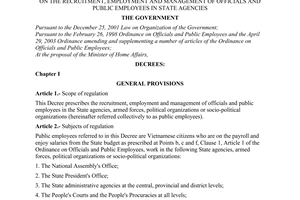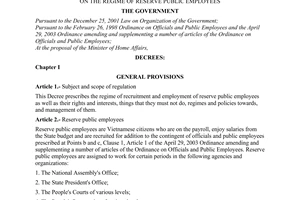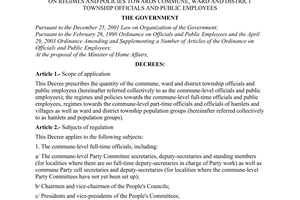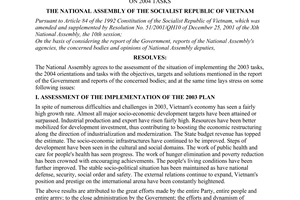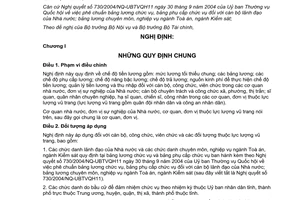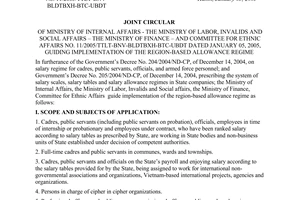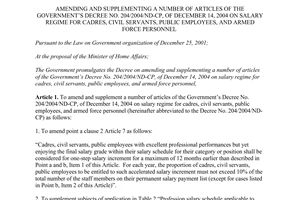Nội dung toàn văn Decree of Government No. 204/2004/ND-CP of December 14th, 2004, on salary regime for cadres, public servants, officials, and armed force personnel
|
THE
GOVERNMENT |
SOCIALIST REPUBLIC OF VIETNAM Independence
- Freedom – Happiness |
|
No : 204/2004/ND-CP |
Hanoi, December 14th 2004 |
THE GOVERNMENT’S DECREE
ON SALARY REGIME FOR CADRES, PUBLIC SERVANTS, OFFICIALS, AND ARMED FORCE PERSONNEL
THE GOVERNMENT
Pursuant to the Law
on Organisation of Government dated December 25th 2001;
Pursuant to Resolution No.17/2003/QH11 dated November 4th 2003 on State Budget
Plan got 2004 and Resolution No.19/2003/QH11 dated November 16th 2003 on the
National Assembly’s (Tenure XI) mandates in 2004 by;
Pursuant to Resolution No.730/2004/NQ-UBTVQH11 dated September 30th 2004 by the
National Assembly’s Standing Committee on approving the salaries and allowances
for positions held by officials of the State, and salaries for public servants
of the Juridical Courts and Procuracy organisations; and
Upon requests by the Minister of Home Affairs and the Minister of Finance,
DECREES:
Chapter I:
GENERAL PROVISIONS
Article 1. Scope of regulation
The Decree provides for salary regime including general minimum salary, salary schedules, allowances, salary grade increment, salary payment; finance sources for salary payment affairs, salary and income control on public servants, civil servants and officials in State agencies and public service agencies; Full-time cadres and cadres and public servants of communes, wards and townships; professional officers and soldiers, non-commissioned officers, soldiers and workers in armed force offices (inclusive of the people’s army and public security forces).
State agencies and public service agencies, offices and units of the aforementioned armed forces hereinafter referred to collectively as agencies and units.
Article 2. Scope of application
Public servants, public employees, officials, and persons of the armed forces are subject to this Decree, including:
1. Management titles in the State and professional titles of the Juridical Courts and Procuracy as provided for in the position salary schedule and position allowance schedule issued together with Resolution No.730/2004/NQ-UBTVQH11 dated September 30th 2004 by the National Assembly’s Standing Committee on approving the position salary schedule and position allowance for senior executives of the State, and for public servants of the justice and the procuracy (hereinafter referred to as Resolution No.730/2004/NQ-UBTVQH11).
2. Elected titles for functions in accords with terms of office in the People’s Committee provinces and cities under the government, and the People’s Committee of districts, townships, and cities under the province.
3. Public servants in offices of the State as stipulated in Article 2 of Decree No.117/2003/ND-CP dated October 10th 2003 by the Government on recruiting, using and governing public servants and officials in offices of the State (hereinafter referred to as Decree No.117/2003/ND-CP).
4. Public servants on probation as stipulated in Article 2 of Decree No.115/2003/ND-CP dated October 10th 2003 by the Government on benefits for public servants on probation (hereinafter referred to as Decree No.115/2003/ND-CP).
5. Officials in public service agencies of the State as stipulated in Article 2 of Decree No.116/2003/ND-CP dated October 10th 2003 by the Government on recruiting, using and governing public servants and officials in public service agencies of the State (hereinafter referred to as Decree No.116/2003/ND-CP).
6. Public servants and officials on the State’s permanent payroll, whose salary is provided for in the State’s salary schedule for persons assigned to work for international associations, non-governmental organisations, projects, offices and organisations in Vietnam.
7. Full-time cadres and public servants in communes, wards and townships (hereinafter referred to full-time cadres and commune-level public servants) as stipulated in Articles 1 and 2 of Decree No.121/2003/ND-CP dated October 21st 2003 by the Government on benefits and remunerations for full-time cadres and public servants (hereinafter referred to as Decree No.121/2003/ND-CP) and Article 22 of Decree No.184/2004/ND-CP dated November 2nd 2004 by the Government detailing the enforcement of Ordinance on Militia (hereinafter referred to as Decree No.184/2004/ND-CP).
8. Full-time cadres responsible for coding in organisations responsible for codes and coding
9. Professional officers and soldiers, non-commissioned officers, soldiers and workers in offices and units of armed forces.
Article 3. Principles for calculation of position allowances and salaries and for payment salary payment and implementation of salary policies
1. Position allowance and salary grading principle
A(n) public servant and official who are appointed to a certain category of public servants or civil servants (hereinafter referred to as category) or a certain professional title of the Juridical Courts and Procuracy (hereinafter referred to as title) shall be entitled to the salary grade in accordance with that category or title.
An elected official who is entitled to position allowance and professional salary shall be entitled to the salary in accordance with the salary categories and grades applicable to administrative public servants and to the position allowance applicable to the elected title that he/she holds.
A(n) public servant, civil servant or official who holds a position of authority (elected or appointed) shall be entitled to a position allowance and salary applicable to that position. If one person who concurrently holds several positions of authority shall be entitled to the position allowance for his/her highest position. One person shall be entitled to pluralism allowance in the case he/she concurrently hold the top management position of another office/agency and/or unit that are allowed to have a full-time top management position..
The remuneration for persons of the armed forces and full-time cadres of in charge of coding and codes in organisations for coding and codes shall be graded in accordance with the respective salary schedules to which they are subject.
The salary grading from old salary schedules to new salary schedules must be done together with the review and rearrangement of staff and personnel in the offices and units; review and improvement of standards for job titles for public servants and civil servants and officials. In the case that their salaries have not been graded in accordance with the regulations set by competent agencies, they must be entitled to a newly-graded salary and position allowance (if any) as stipulated.
2. Salary payment principle
The salary payment must be undertaken on the basis of the performance by public servants, civil servants and officials and the office’s and unit’s financial source for salary payment (from the State budget or collected revenues used for salary payment as provided for by the law).
3. Principles for the implementation of salary and remuneration policies
Once a(n) public servant, civil servant or cadre or officer in the armed forces changes his/her duty, her/his salary and position allowance (if any) shall be recomputed in accordance with his/her new duty. In the case that one person leaves his/her position of authority (excluding the cases of dismissal for disciplinary reasons, removal or non-reappointment) to take another job or hold another position of authority which have lower salary and position allowance, he/she shall be entitled to the salary and/or allowance applicable to his/her former position for 6 months since his/her departure from his/her former position; after that his/her position allowance and salary (if any) shall be re-graded in accordance with his/her new duties and responsibilities.
As required by the work, once a(n) public servant, civil servants, cadres or officer in the armed forces who hold a position of authority is appointed to another position of authority with lower salary and position allowance, he/she shall be entitled to the position allowance and salary applicable to the former position. In the case that the salary computed in accordance with the new salary category or position allowance is lower that his/her former ones, he/she shall be entitled to the salary and allowance (if any) applicable to his/her former position and his salary grade increment shall be exercised in accordance with provisions applicable to his/her former salary category or position.
In the case that a person who transfers from the armed forces, or coding and codes organisations, and State-owned enterprises to state agencies or State public service agencies, his/her salary shall be recomputed in accordance with his/her new salary category, grade and position allowance (if any) applicable to his new position. In the case, the salary which is computed in accordance with the salary category applicable to officers, non-commissioned officers or to the professional personnel of the people’s army and technical staff of the public security force is higher than the new salary grade, he/she shall be entitled to the new salary grade plus the excess as provided for the law.
The salary and allowance grade calculation, increment and payment, and salary and income control must be done for the right target group and in accordance with the specified scope, principle, condition and other regulations as provided for by competent agencies.
The salary services must be done in parallel with the administration reform in a way that ensure the balanced harmony among various industries, professions, types and grades of public servants and officials; as well as the socio-political stability.
Chapter II
MINIMUM SALARY, SALARY SCHEDULE AND SALARY ALLOWANCE
Article 4. General minimum salary
General minimum salary applicable to officials, public employees, public servants and armed force personnel shall be in accordance with the provisions of Decree No.203/2004/ND-CP of December 14, 2004 by the Government prescribing minimum salary level.
Article 5. Salary schedules, allowance schedules for non-commissioned officers, soldiers on military service, and leaders.
Issued together with the Decree are salary schedules, rank allowance schedules for non-commissioned officers, soldiers on military services and position allowance for position of authority as follows:
1. Salary schedules:
a) 7 following salary schedules are stipulated:
Table 1: Salary schedule applicable to senior experts.
Table 2: Profession salary schedule applicable to cadres and public employees in the State agencies (including those who hold elected positions that entitle them to the salary which is determined in accordance with the salary schedule applicable to administrative public servants and with the position allowance schedule applicable to positions of authority and public servants in communes, wards and townships).
Table 3: Profession salary schedules applicable to cadres and public servants in the State public service agencies units.
Table 4: Salary schedule applicable to staff members who work in the State agencies and public service agencies units.
Table 5: Salary schedule applicable to the full-time cadres in communes, wards and townships.
Table 6: Salary schedule applicable to officers in the people’s army, and officers and non-commissioned officers in the people’s public security force
Table 7: Salary schedule applicable to professional soldiers in the people’s army and technical specialists the people’s public security force.
b) Salary of cadres in charge of coding and codes in organisations responsible for coding and codes shall be determined in accordance with the salary schedule applicable to officers in the people’s army, and officers and non-commissioned officers in the people’s public security force (table 6) with the highest salary grade equal to that of Major-general (exclusive of detached officers in people’s army and public security force), and the Salary schedule applicable to professional soldiers in the people’s army and technical specialists the people’s public security force (Table 7 ).
c) The workers who work in the agencies and units in the armed force, and organs for codes and coding are subjected to the salary scale and schedules applicable to State-owned enterprises.
2. Allowance schedule for non-commissioned officers, soldiers on military service in people’s army and public security force.
3. Position allowance schedule applicable to positions of authority (elected and appointed) in State agencies and public service agencies; units and organs in people’s army and public security force.
Article 6. Salary allowance regimes
1. Allowance for working years in excess of the required number of working years:
Applicable to the persons whose salaries are determined in accordance with the Tables 2, 3, 4 and 7 as provided for in Item 1, Article 5 of this Decree, and with the profession salary schedule applicable to cadres and public servants in the Juridical Courts and Procuracy as provided for in Resolution No.730/2004/NQ-UBTVQH11 an who are currently entitled to the highest salary grade for their position or salary category.
a) Allowance to be computed as follows:
a1) For those whose salaries are computed in accordance with the categories of type A0 -A3 in Table 2 and 3, titles listed at professional salary schedule for the sectors of the Juridical Courts and Procuracy: after 3 years (36 full months), if they are entitled to the highest salary grade in their salary category or the highest salary grade applicable to their positions, they shall be entitled to the allowance for excessive working years equivalent to 5% of salary level in the highest salary grade in their salary category or the highest salary grade applicable to their positions, from the 4th year on, each year additional 1% is added for the purpose of allowance computing.
a2) For those whose salaries are computed in accordance with the categories of type B and C of Tables 2 and 3, and staff who do not hold position of authority and whose salaries are determined in accordance with salary schedule in Table 4: after 2 years (24 full months), if they are entitled to the highest salary grade in their salary category or the highest salary grade applicable to their positions, they shall be entitled to the allowance for excessive working years equivalent to 5% of salary level in the highest salary grade in their salary category or the highest salary grade applicable to their positions, from the 3rd year on, additional 1% is added each year for the purpose of allowance computing.
b) For those listed at Point a (a1 and a2), Item 1, Article 6 fail to fulfil their annual assignments or are subjected to such discipline as reprimand, warning, displacement, the working period they must complete before they are entitled to the allowance for excessive working years shall be increased by one year (12 full months) for each year of shortcomings or failure.
c) The allowance for excessive working years is used for computing the fees for and benefits from social insurance.
2. Pluralism allowance:
The person with office title at one office or unit (either elected or appointed) shall benefit from pluralism allowance for his/her office title in other office(s) and/or unit(s) if he/she is elected and/or appointed as the top management position of such office(s) and/or unit(s) that are allowed to have the part-time head.
The rate of allowance equals to 10% of the current salary plus position allowance for leaders and the allowance for excessive working years (if any). The persons who concurrently hold more than one top management positions are entitled to receive the allowance attached to one office only.
3. Regional allowance:
Applicable to the persons who work in remote and isolated areas and areas affected by bad weather conditions.
The allowance consists of seven levels of 0.1, 0.2, 0.3, 0.4, 0.5, 0.7 and 1.0 on the basis of the general minimum salary level. As for non-commissioned officers and soldiers on military service in the armed forces, regional allowance is computed on the basis of the allowance for privates.
4. Special allowance:
Applicable to the persons who work on far-reaching islands and in the border area with extremely difficult living conditions.
The allowance consists of three levels of 30%, 50% and 100% of current salary level in addition to the position allowance and the allowance for excessive working years (if any) or that for current military rank for non-commissioned officers and soldiers in the armed forces.
5. Inducement allowance:
Applicable to the officials, public employees and public servants who voluntarily work in new economic zones, economic establishments and on islands far away from the mainland in extremely disadvantaged living conditions.
The allowance consists of four levels of 20%, 30%, 50% and 70% of the current salary level in addition to the position allowance and the allowance for excessive working years (if any).
The duration for allowance is between 3 - 5 years.
6. Mobility allowance:
Applicable to the officials, public employees and public servants who do some jobs that requires a frequent relocation of working and living places.
The allowance consists of three levels of 0.2, 0.4 and 0.6 which are computed on the basis of general minimum salary level.
7. Toxic allowance:
Applicable to the officials, public employees and public servants who work in toxic and dangerous conditions, but yet included in the computation of the salary schedule.
The allowance consists of four levels of 0.1, 0.2, 0.3 and 0.4 which are computed on the basis of general minimum salary level.
8. Job-specific allowance rates:
Seniority allowance:
Applicable to the officials and professional soldiers under people’s army, salaried officers and non-commissioned officers in the people’s public security forces, customs officers and persons in charge of codes and coding in organisations for codes.
The allowance rate is specified as follows: after five years (60 months) in military service or of continuous service in the customs sector and security organs, the officials shall be entitled to a seniority allowance equal to 5% of the current salary level in addition to the position allowance and allowance for excessive working years (if any); from the sixth year on, 1% is added in the computation of allowance each year.
b) Occupation-specific preferential allowance:
Applicable to the cadres, civil servants, and public servants who are involved in the trades or jobs which require higher level of competency than usual, who are entitled to the State’s preferential policies, which have not been included in the computation of the salary schedules.
The allowance consists of 10 grades of 5%, 10%, 15%, 20%, 25%, 30%, 35%, 40%, 45% and 50% of the current salary level in addition to the position allowance and the allowance for excessive working years (if any).
c) Occupation-specific responsibility allowance:
Applicable to the titles listed in professional salary schedule and salary schedule for job titles in Court, Procuracy, Inspectorate and some judiciary titles.
The allowance includes five levels of 10%; 15%; 20%, 25% and 30% of current salary level in addition to the position allowance and the allowance for excessive working years (if any).
The persons who are subjected to occupation-specific responsibility allowance regime as stipulated at this point are not entitled to occupation-specific preferential allowance regime provided for at Point b, Item 8 of this Article.
d) Job-specific responsibility allowance:
d1) The persons who work in organs for codes and coding are entitled to responsibility allowance for maintaining the confidentiality of codes.
The allowance consists of three levels of 0.1; 0.2 and 0.3 against the general minimum salary level.
d2) The persons who are either involve in the job requiring a high sense of responsibility or work as managers without the leadership title (either elected or appointed) are entitled to job-specific responsibility allowance.
The allowance consists of four levels of 0.1; 0.2; 0.3 and 0.5 which are computed on the basis of the general minimum salary level.
e) Allowance for service in national defence and security:
Applicable to the persons whose salaries are not determined in accordance with at Tables 6 and 7 stipulated at Item 1, Article 5 of this Decree, working in agencies and units in the armed forces and code and coding agencies.
The allowance consists of two levels of 30% and 50% of the current salary level in addition to the position allowance and the allowance for excessive working years (if any).
Chapter III
REGIMES ON SALARY GRADE INCREMENT, SALARY PAYMENT, SALARY AND INCOME MONITORING
Article 7. Regulations on salary grade increment
1. Salary grade increment is regularly practised on the basis of the professional performance of cadres, civil servants and the duration in which they are entitled to the salary grade within the relevant category or applicable to the title.
The duration in which they are entitled to the salary grade within the relevant category or applicable to the title to be used for consideration of salary increment shall be stipulated as follows:
a) For the title of high-ranking experts, who are not entitled to the highest grade in the salary schedule, after 05 years (60 full months) of their service which entitles them to the salary grade in the salary schedules applicable to high-ranking experts, they shall be considered for a one-step salary increment.
b) For those listed in Table 2, 3, 4 in Item 1, Article 5 of the same Decree and particular salary schedules of Juridical Courts and Procuracy as provided for in Decision No.730/2004/NQ-UBTVQH11 if they are not entitled to the highest salary grade in their salary schedule then, duration in which they are entitled to salary grade within relevant scale or title is to be used for consideration of salary increment shall be stipulated as follows:
b1) For those persons listed from A0 to A3 in Table 2, 3, titles listed in particular salary schedules of Juridical Courts and Procuracy: one-step salary increment shall be considered after 03 years (36 months) of service which entitles them to the current salary grade within the relevant salary schedules applicable to category and title.
b2) For those persons listed in B, C in Table 2, 3, executive staff and servants listed in Table 4: one-step salary increment shall be considered after 04 years (24 months) of service which entitles them to the current salary grade within the relevant salary schedules applicable to category and title.
c) If those persons mentioned in Point a and b, Item 1 of this Article either fail to fulfil their annual assignments or are subject to such disciplines as reprimand, warning, displacement, the working period they must complete before they are to be considered for salary increment shall be increased by one year (12 full months) for each year of shortcomings or failure as compare with the normal working period as stipulated by the law.
2. Accelerated salary increment is shall be considered in the following cases:
a) Cadres, officials, civil servants with excellent professional performances but yet enjoying the final salary grade within their salary schedule for their category or position shall be considered for one-step salary increment for a maximum of 12 months earlier than described in Point a and b, Item 1 of this Article. For each year, the proportion of cadres, officials, civil servants to be entitled to such accelerated salary increment must not exceed 5% of the total number of the staff members on their permanent payroll (except for cases listed in Point b, Item 2 of the same Article).
b) Cadres, officials and civil servants, who have already been informed of the retirement decision as stipulated by the State and completed their mission, but who are not entitled to the highest grade in their salary schedules for their category or position and whose pay period following the date of their promotion, appointment or reclassification to their current position is not sufficient long at the retirement announcement date, shall be entitled to one-step salary accelerated increment for a maximum of 12 months earlier than described in Point a and b, Item 1 of the same Article.
3. Promotion and reduction of military rank, raise of salary and military rank allowances for officers, non-commissioned officers, soldiers, professional servicemen and technical staff in military forces must follow prevailing legal regulations applicable to the armed forces.
Article 8. Salary regimes
1. Salary is based on cadres’ and public servants’ professional performance, agencies’ financial resources for salary payment and salary policies. Heads of agencies/units after discussing with their trade union's executive committees shall be responsible for developing and implementing salary policies applicable to their staffs. Salary policy must be under control of higher-level organs and practised transparently in each agency/unit.
Salary within the armed forces must follow prevailing regulations.
2. Salary regime for nigh shift and overtime work applicable to cadres, officials, civil servants is practised in accordance with Labour Code.
Cadres, civil servants and officials on duty for either 12/24 hours or 24/24 hours shall be entitled to particular salary or allowance regime which is approved by Government, the Prime Minister.
3. Salary regime for work during paid holidays, advance payment of salary during temporary suspension in work, temporary detainment, shall be implemented in accordance with Decree No.114/2002/ND-CP dated December 31st 2002 by the Government elaborating and guiding the implementation a number of articles on salary provisions in the of Labour Code.
4. Cadres, civil servants, officials listed in the salary schedule of their office, salaried personnel in the armed forces if assigned to be away on mission, to work or to study abroad for over 30 consecutive days or more while enjoying either State-subsidised subsistence fee or salary, subsistence fee granted by foreign governments, international organisations shall be entitled to receive 40% of their current salary plus position allowance and seniority allowance (if any).
5. Civil servants on probation and those on job-training in State bodies (inclusive of commune-level civil servants serving their apprenticeship) and State service bodies shall be entitled to a rate of salary as described in Article 18 of Decree No.115/2003/ND-CP Article No.21 of Decree 116/2003/ND-CP Article 18 of Decree No.117/2003/ND-CP Article 4 of this Decree.
6. The application of salary regimes, to be effective as of January 1st 2005, applicable to commune-level full-time cadres, civil servants, who are entitled to pension or poor health subsidies shall be stipulated as follows:
a) Commune-level full-time cadres who currently receive pensions or poor health subsidies shall be entitled to monthly salary equivalent to 90% of the grade 1 in the salary schedule applicable to their position as described in this Decree and shall be exempted from social, medical insurance premium.
b) Commune-level civil servants who currently receive pensions or poor health subsidies shall be entitled to monthly salary equivalent to 90% of the grade 1 in the salary schedule applicable to administrative public servants with the same training level as described in this Decree and shall be exempted from social, medical insurance premium.
Article 9. Salary resources
1. 10% of regular expenditure (exclusive of salaries and salary-related payment) is required to be saved in every administrative and service under the line ministries, agencies, central agencies and provinces and cities under the Government.
2. At least 40% of the revenues which are to be kept for the revenue-generating public-service agencies’ own use shall be required to be spent on salary (including bodies which already apply fiscal regime applicable to revenue-generating agencies). For public-service agencies in the health care sector, at least 35% shall be spent on salary.
3. A minimum of 40% of collected money is required to be unspent as regulated for profit-making administrative bodies.
4. 50% of monetary increase in the budget and financial estimates of the current and preceding years as set forth by the Prime Minister and 50% of monetary balance between actual revenues and planed budget revenues set forth by the Prime Minister shall be spent on salary.
5. Central budget shall be used as a supplementary source for financing salary payment in ministries, central agencies, cities under the Government, provinces in the case that there is a lack of financial resource to cover salary payment even after all the possibilities have been exploited in accordance with the provisions at Points 1, 2, 3 and 4 of this Article.
Article 10. Salary and income monitoring
1. Salary payment, allowance, salary raise and income monitoring shall be exercised as described in this Decree and in accordance with guidance by competent agencies.
Administrative bodies that apply block staffing and block budget grant mechanism and financial autonomy and self-management mechanisms, depending on the saving of administrative expenses, increase of collected revenues shall decide on the salary increment factor against the general minimum salary level and on the formation of welfare or prize funds with a view to increasing the income of cadres, public servants and civil servants on their permanent payroll as provided by competent agencies.
2. Decentralisation of responsibility shall be exercised so that the heads of State bodies, heads of State public service bodies could make their decision on regular salary increment, accelerated salary increment and increase of allowance for excessive working years for cadres, civil servants and officials under their scope of authority as by authorised by competent bodies.
3. For titles of high-ranking experts, high-ranking specialists and relevant titles, the decentralisation of responsible for decision on salary grade, salary increment and increment of allowance for excessive working years shall be exercised as follows:
a) For high-ranking experts: salary, regular or accelerated increment of salary grade shall be decided in accordance with current authorisation.
b) For high-ranking specialists and equivalents (Type A3):
b1) The decision on the classification of salary to type A3 once the election results, appointment to the category (or the position), increment, reclassification of category have been shall be exercised in accordance with current authorisation.
b2) The decision on regular increment of salary grade, or allowance for excessive working years' within the category or positions of type A3 shall be made by the Chief of Supreme People's Court, Chief of Supreme People's Office of Procuracy, ministers, heads of ministerial equivalents Government agencies, chairpersons of Centrally-governed municipal and provincial People's Committees, that exercise direct management over such cadres, civil servants and officials and the afore-mentioned relevant bodies shall be responsible for reporting the result to the Ministry of Home Affairs.
b3) Accelerated salary grade increment (applicable to those cadres who have excellent professional performance who have been given the notice of their retirement) within a relevant category or position title of type A3 shall be decided after getting agreement of Home Affair Minister by Chief of Supreme People's Court, Chief of Supreme People's Office of Procuracy, ministers, heads of ministerial equivalents, Government agencies, chairpersons of Centrally-governed municipal and provincial People's Committees, which are directly in charge of managing such cadres, public servants and civil servants. These afore-mentioned parties shall be responsible for reporting the result to the Ministry of Home Affairs.
Chapter IV
EXECUTIVE PROVISIONS
Article 11. Responsibility for guiding and executing
1. Ministry of Home Affairs is the main responsible body in cooperation with Ministry of Finance, other concerned ministries and bodies:
a) Guiding salary reclassification for cadres, civil servants and officials and reclassification of cadres, public servants and civil servants as stipulated in this Decree.
b) Guiding the grading of salary, increment of salary and allowance for those who work in organs for codes and whose salaries funded by State-budget as stipulated in this Decree.
c) Guiding the professional salary grading for those who hold a position of authority (either elected or appointed), which entitles them to particular salary regimes and position allowance for in State offices and State public service agencies. Their new salary (including profession, performance, service-based salary plus the position allowance) must be no less than their previous one.
d) Guiding salary grading for cadres, civil servants, officials when changing their jobs and of those who leave their work from armed forces, organs for code and State companies to work in State offices and State public service bodies.
e) Guiding the implementation of position allowance regimes (either elected or appointed) as provided for in Decision No.730/2004/NQ-UBTVQH11 and Item 3, Article 5 of this Decree.
f) Guiding the implementation of salary allowance regimes as provided for in Article 6 of this Decree.
g) Guiding regulations on salary grade increment as provided in Article 7 of this Decree and decentralising the authority for deciding on salary, salary grade increment for cadres, public servants and civil servants, and staff working in organs for codes as provided in Item 2, 3 of Article 10 in this Decree.
h) Checking the implementation of salary re-arrangement and salary regimes in ministries, agencies and provinces.
2. Ministry of Finance is the main responsible party in cooperation with Ministry of Home Affairs, other concerned ministries, offices and Centrally-governed provincial, municipal people’s committees:
a) Guiding the financial balancing of salary expenditure provided for in Article 9 of this Decree.
b) Checking the implementation of salary regimes in such units that are self-sufficient in their funding sources for salary payment; conducting appraisal and proposing to the Prime Minister for granting supplementary salary funds of ministries, central agencies, Centrally-governed cities, provinces, which do not have sufficient funding for salary payment. The supplementary salary fund must not exceed annual State budget estimate.
c) Guiding the practice of block staffing block administrative expenditure grant for public administrative agencies and financial autonomy in State public service agencies as provided for in Item 1, Article 10 of this Decree.
3. Ministries, ministerial equivalents shall be responsible for:
a) Studying in cooperation with Ministry of Finance and proposing to the Government, the Prime Minister for an amendment of regulations on the management, allocation and utilisation of collected revenues, fees and charges within their authority.
b) Cooperating with Ministry Home Affairs, Ministry of Finance to review and formulate occupational preferential allowance schemes applicable to those under their authority, then submit to the Government, Prime Minister for consideration of issuance and adjustment in accordance with Point b, Item 8, Article 6 of this Decree; reviewing and submitting to the Government, the Prime Minister for revisions or abolishment of other subsidies, allowances (including subsidies, allowances in cash), particular salary or allowance regimes as provided in Item 2, Article 8 of this Decree.
c) Applying financial mechanism in revenue-generating administrative bodies under their authority.
4. Supreme People's Court, Supreme People's Procuracy, Ministry of Justice, Government Inspectorate shall cooperate with Ministry of Home Affairs, Ministry of Finance to review and formulate responsibility allowance regimes for those under their authority to submit to the Government, Prime Minister for consideration of issuance, revisions in conformity with Point c, Item 8, Article 6 of this Decree; in addition the afore-mentioned agencies shall conduct review and submit proposal to the Government, the Prime Minister for a revision or abolishment of other regimes of subsidies, allowances (inclusive of subsidies and allowances in cash).
5. Ministry of Defence, Ministry of Public Security shall cooperate with Ministry of Home Affairs, Ministry of Finance to review and formulate particular regimes of allowances for people's armed forces and police, subsequently submit to the Government, the Prime Minister for approval as well as to guide the implementation of this Decree for those under their authority.
6. Centrally-governed provincial, municipal People's Committees shall be responsible for finding measures to ensure sufficient financial resources for salary payment in accordance with Article 9 of this Decree.
7. Ministers, heads of ministerial equivalents, Government's agencies, chairpersons of Centrally-governed municipal, provincial People's Committees shall be responsible for making the rearrangement for the reclassification of salary for cadres, civil servants, officials and armed force personnel in units under their authority; studying and developing funds for salary payment in accordance with Article 9 of this Decree, and subsequently reporting to Ministry of Home Affairs - Ministry of Finance for appraisal and monitoring.
Article 12. Enforcement
1. This Decree shall come into effect 15 days after its publication on the Official Gazette.
Salary regimes prescribed in this Decree take official effect on October 1st 2004.
2. For current occupation or job-related preferential allowances, ministries and central agencies shall be responsible for reporting to the Government, Prime Minister for issuance of occupation or job-related preferential allowance regimes to make them in accordance with the provisions at Point b, c, Item 8, Article 6 of this Decree. The retrospective payment of such allowances on new rate should start on October 1st 2004.
3. This Decree shall supersede Decree No.25/CP dated May 23rd 1993 by the Government on temporary provisions of new salary regimes for civil servants, administrative staff, and armed force personnel.
Provisions on salary and allowances in conflict with provisions specified in this Decree shall be nullified.
4. Provisions on authority of deciding regular increment of salary grade (including allowance for excessive years of working), accelerated increment of salary grade of high-ranking experts, type A3 listed in point b (b2, b3), Item 3, Article 10 of this Decree shall supersede the provisions on authority of deciding increment of salary grade of high-ranking experts, civil servants, officials as high-ranking experts specified in Item 7, Article 41 of Decree No.117/2003/ND-CP Item 8, Article 46 of Decree No.116/2003/ND-CP
5. Salary schedules applicable to cadres of communal militia provided in Article 22 of Decree No.184/2004/ND-CP shall be recomputed in accordance with the provisions in this Decree and take official effect as of January 1st 2005.
6. Allowance as prescribed in Decree 35/2001/ND-CP dated July 9th 2001 by the Government on remuneration policies for teachers, education managers working in special schools/training institutions, exceptionally socioeconomically underprivileged areas shall be recomputed in accordance with the provisions this Decree.
7. The provisions specified in following regulatory documents shall be nullified:
a) Articles 2, 3, Items 1, 3, 4, 5, 6 and 8, Article 4 and Item 5 of Decree No.03/2003/ND-CP dated January 15th 2003 by the Government on adjusting salary regimes, social allowance and salary management.
b) Points a, b, c, d, e of Item 1, Point c of Item 2, Articles 4 and 6 of Decree No.121/2003/ND-CP dated October 21st 2003 by the Government on policies applied to cadres, civil servants working in communes, wards and town (ships).
8. Provisions of this Decree may be applied to non-State service agencies where suitable.
Article 13. Execution responsibilities
Ministers, heads of ministerial equivalents, Government agencies, chairpersons of Centrally-governed municipal, provincial People's Committees shall be responsible for implementing this Decree./.
|
|
FOR AND
ON BEHALF OF THE GOVERNMENT |
|
FILE ATTACHED
|





